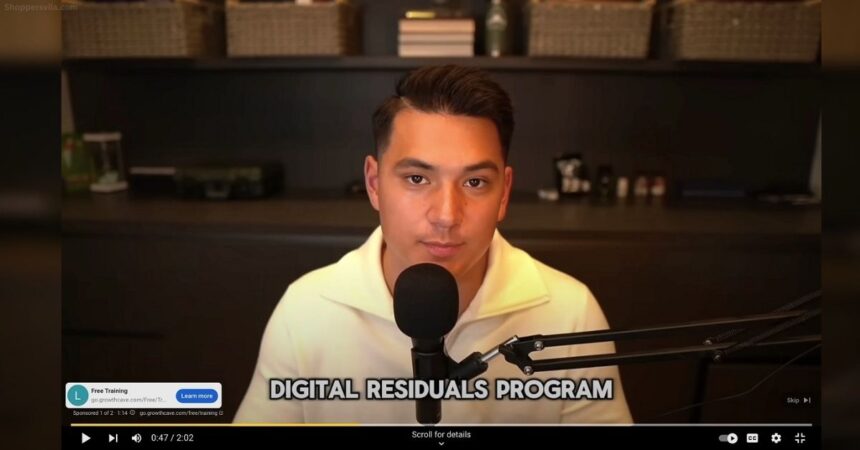A new scam making the rounds promises easy passive income through a little-known YouTube “residuals program.” But can you really get paid for watching videos? As we uncover, clever marketing hides a formula craftily devised to profit off people’s financial hopes through deception.
Meet YouTube’s Digital Residual Pitchman Lucas Lee Tyson
“What if I told you YouTube has been paying people for years just to watch videos?” entices a confident Lucas Lee Tyson over footage of luxury cars and tropical vacations. “I tapped into a digital residuals income stream that changed my life overnight.”
According to Tyson, he struck it rich in his early 20s thanks to YouTube’s residuals program which pays viewers a slice of ad revenue from videos they watch. He claims residual income allowed him to make millions without ever uploading viral videos himself.
The catch? You must pay Tyson to access secrets for maximizing “digital residual” payouts. His gauges range from $997 for starter training to $10,000 “executive” packages.
User Reviews Stated the Program as “Devastating Ripoff”
Seductive tales of no-work wealth convince many to fork over stiff training fees to Tyson. But instead of cutting viewers in on profits, Tyson cuts communication after payments clear. No further support or guidance comes for his bilked clients.
“I scraped together $5k for their Diamond Plan since Lucas said that level practically guarantees 6-figure income,” shares Tim L., an unemployed father clinging to false hopes of providing for his family. “Now when I email the Digital Residuals support team, all I hear back is crickets. Need this bad for my kids but starting to think it was all BS.”
Victoria K. tells her own disheartening story after investing on Tyson’s entry-level training that promised access to the residuals income stream.
12 days since purchasing their crappy course and still no sign of actual money like they trumpeted. When I asked about seeing residuals I just got a boilerplate email talking in circles. Starting to panic over this devastating ripoff.
YouTube Denies Tyson’s Misleading Claims
When reached for comment over allegations of paying viewers, a YouTube spokesperson denied such a program exists.
No part of our monetization model involves compensating viewers with a portion of ad revenues earned by creators. Any claims of being able to make residual income merely by watching YouTube videos are false.
So where do the hyped residuals that seduce Tyson’s victims originate? Nowhere, according to mounting complaints.
Red Flags: How to Spot YouTube Residual Program Scams
While Tyson’s residual consonant concept admittedly offers mass appeal, several core flaws expose his con:
1. No Transparency
Tyson lures people in with vague claims then hides critical specifics like precise payment calculations until after extracting payments. Legitimate businesses share exact details upfront.
2. Fake Reviews to look Legitimate
Numerous sites eerily echo Tyson’s pitch with a conspicuous absence of objective consumer feedback. Protect yourself by researching beyond advertisements.
3. Upfront Payment
Money flows out of victims’ pockets first with only empty residual income promises flowing back. Real opportunities prove their worth before requiring payment.
4. Refusal to Address Concerns
Stonewalling replaces support post-purchase, leaving customers abandoned after forking over thousands. Unanswered questions and denied refund requests also typify Tyson’s tactic.
Is Tyson Legit or Breaking Laws?
Potentially, according to Asia C., an attorney familiar with online consumer scams. “If substantiated, these predatory practices clearly constitute fraud,” she comments. “The problem comes in victims definitively proving damages in court and locating defendants to hold them accountable.”
For now Tyson continues promoting his residuals scam across social media platforms. Proving criminal charges usually requires collecting extensive evidence plus testimony demonstrating calculated deception.
Stay Safe: Avoiding “Get Rich Quick” Schemes
While the lure of easy income persists, liquid dreams often leak disappointingly. Protect yourself with pragmatism.
1. Verify Bold Claims
Consult impartial third-party sources to fact-check promotional pitches rather than accepting a salesperson’s narrative. Had Tyson’s victims checked his assertions against YouTube’s policies, for instance, they may have safeguarded their money.
2. Research Reviews
Look beyond curated comments on an offerer’s own website, which hide unhappy customers. Independent consumer sites contain more balanced feedback.
3. Don’t Pay Upfront
Reputable money-making techniques first demonstrate effectiveness on a small scale before asking for larger buy-ins. Responsibly build towards bigger commitments after seeing initial results.
By staying grounded against increasingly clever online fraudsters, maintaining reasonable expectations, and vetting every opportunity thoroughly, each of us can guard our hard-earned resources.





























